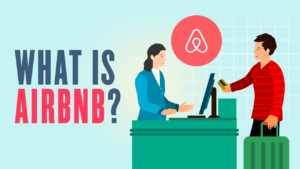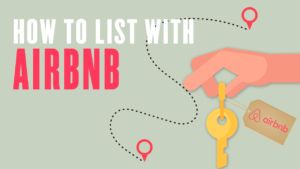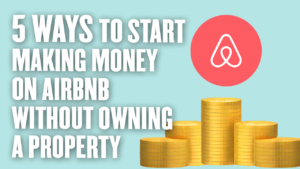In your quest for methods to generate income on Airbnb without property ownership, subletting may have seemed the sole avenue. Contrary to this perception, multiple alternative pathways exist. Beyond subletting, opportunities abound to earn substantial income, surpassing $100,000 annually, even without property ownership. From co-hosting to embracing the role of a vacation rental consultant, we present the top ten strategies for capitalizing on Airbnb without property investment.
What is Airbnb?
 If you’re an enthusiastic holidaymaker, you’re likely familiar with the platform connecting travellers to temporary lodgings. This platform, known as “Air Bed and Breakfast” or Airbnb, was established by two industrial designers who relocated to San Francisco in 2008.
If you’re an enthusiastic holidaymaker, you’re likely familiar with the platform connecting travellers to temporary lodgings. This platform, known as “Air Bed and Breakfast” or Airbnb, was established by two industrial designers who relocated to San Francisco in 2008.
Facing financial constraints on their apartment rent, they innovatively began offering their space for short-term rentals to those unable to secure hotel accommodations. This ingenious move swiftly gained traction, evolving into a sprawling network of 4 million hosts globally. To this day, their platform remains a catalyst for generating opportunities, not only for hosts but also for real estate investors at large.
Airbnb as a passive income:
Based on data from AirDNA, short-term rental hosts achieved their highest average yearly earnings in 2021, reaching £56,000. While a slight 5% decline is projected for this year due to increased supply and reduced rates, stability is anticipated, followed by further growth in 2023. Despite inflation and soaring fuel costs, recent surveys indicate minimal impact on American travel plans, indicating the resilience of these forecasts against economic challenges.
If you’ve been hesitant about venturing into short-term rental investment due to its complexity, your concerns are valid. Managing a vacation rental involves multiple intricacies, from guest satisfaction to maintaining positive reviews. This is where an experienced and reputable vacation rental property manager proves invaluable, justifying their fees.
If you possess or discover a property with potential as a splendid vacation rental, consider the financials and assess whether engaging a property manager could make vacation rental hosting a viable pursuit. You might realize that becoming an Airbnb host can be a pleasant and profitable experience.
How to List With Airbnb
 The decision of when to make your space available and its pricing is at your discretion. Listing is without charge, and you have the autonomy to approve potential guests. When determining the price, researching local rates through competitor listings is recommended. It’s vital to account for hosting expenses, including cleaning, increased utility costs, taxes, and Airbnb’s 3% host fee for payment processing. Your guests cover Airbnb’s booking fees of 6% to 12%. Familiarize yourself with Airbnb’s hosting criteria, encompassing accurate listings, effective communication, honoring reservations, thorough cleaning for each guest, and provision of basic amenities like soap and toilet paper.
The decision of when to make your space available and its pricing is at your discretion. Listing is without charge, and you have the autonomy to approve potential guests. When determining the price, researching local rates through competitor listings is recommended. It’s vital to account for hosting expenses, including cleaning, increased utility costs, taxes, and Airbnb’s 3% host fee for payment processing. Your guests cover Airbnb’s booking fees of 6% to 12%. Familiarize yourself with Airbnb’s hosting criteria, encompassing accurate listings, effective communication, honoring reservations, thorough cleaning for each guest, and provision of basic amenities like soap and toilet paper.
Prior to photographing your space, ensure it’s cleaned and decluttered to showcase its best features. In many cities, if you’re an active host, Airbnb might even arrange for a professional photographer to capture your space at no charge. When describing your place, highlight its distinctive qualities and envision it from the viewpoint of an out-of-town guest. Is your place conveniently near public transport? Does it offer proximity to top-notch dining, nightlife, or cultural attractions? Detail the amenities you provide, such as Wi-Fi, a well-equipped kitchen, cable TV, or an outdoor patio.
Do you need to own a property to earn in Airbnb’s?
As previously noted, commencing an income stream on Airbnb doesn’t necessitate property ownership. Furthermore, sizeable initial funds are often unnecessary for initiating your Airbnb endeavour. Numerous ingenious and resourceful pathways exist to step into the holiday rental sector and establish a lucrative enterprise.
5 Ways to Start Making Money on Airbnb without Owning a Property
-
Become a Short-term Property Manager
Becoming a property manager for vacation rentals offers a lucrative path to profit without owning property. With the industry’s growth, demand for managers is high, providing flexibility. Responsibilities encompass owner relations, guest communication, bookings, check-ins, marketing, property maintenance, and more. Legal requirements vary by state, with some needing licenses. Even without mandates, enhancing your property management knowledge will give you an edge in the competitive field.
-
Collaborate as an Airbnb Co-host
Co-hosting shares duties with rental managers, but in a more supportive role. It’s ideal for newcomers to the industry. As a co-host, you’ll assist the primary host with tasks like confirming bookings, guest communication, overseeing check-in/out, property checks, cleaning coordination, restocking, and guest reviews. It’s a great entry point for gaining experience in the vacation rental business.
Advantages:
- Enjoy greater flexibility in your work hours.
- No license is required to become a co-host.
Disadvantages:
- Lower profitability compared to being an Airbnb host.
- Income will be subject to fluctuations.
How much can you earn as a co-host?
Co-hosts typically receive 10-20% of each booking’s income. For instance, if an Airbnb property you co-host generates £30,000 annually, your earnings might range from £3,000 to £6,000. Assuming additional responsibilities and overseeing the entire process could potentially increase your share to 25% per booking.
-
Offer Expertise as an Airbnb Consultant
If you possess knowledge in managing Airbnb properties and aspire to assist fellow entrepreneurs in their growth journey, becoming an Airbnb advisor is a viable option. Apart from your operational experience with short-term rentals, proficient marketing skills are crucial for establishing your personal brand.
In this role, you’ll guide hosts in optimizing their bookings, enhancing their rankings, and potentially facilitating the buying and selling of short-term rentals. Defining a focused niche is key to thriving as a consultant. Prior research and aligning your skill set with the services you offer are pivotal in determining your consultancy’s success.
Advantages:
- Minimal initial expenses for starting.
- Opportunity to establish yourself as an authority.
Disadvantages:
- Pre-existing experience as an Airbnb host is necessary.
- Self-motivation is essential.
What is the potential income for an Airbnb consultant?
The average annual salary for an Airbnb consultant in the United States is around $61,000. Senior consultants earn an hourly wage of about $82.46, which is 62% higher than the national average.
-
Start and Airbnb cleaning service
Creating an Airbnb cleaning business is a lucrative venture, often the initial task hosts delegate. The demand for such services remains consistent.
To establish your own Airbnb cleaning service, thorough research is vital. Explore competitors’ offerings and industry benchmarks. Be aware of any state-specific prerequisites like insurance and licensing, while understanding customary cleaning rates. Consider all expenditures, including cleaning supplies, tools, labour, and promotional efforts.
Advantages:
- Abundant work due to hosts frequently outsourcing cleaning.
- Lower startup costs compared to vacation rental franchises.
Disadvantages:
- Personal marketing efforts required.
- Essential to build a reliable team for a fully operational cleaning business.
Earnings Potential:
Hourly rate for US Airbnb cleaners averages around £18.72, 39% higher than the national average. Self-employed cleaners earn at least £25 per hour, considered a living wage. Monthly earnings range from £900 to £7,700, based on cleaning rates and property volume. Profit potential is substantial.
-
Host an Airbnb Experience
Crafting an Airbnb Experience is a dynamic avenue for earning without leasing property. Launched in 2016, Airbnb Experiences has empowered hosts to secure consistent income through diverse activities. As a participant, you can present an array of guest-bookable undertakings, like guided tours, cooking sessions, or artistic workshops. If you possess a distinct hobby or expertise, this option can stand as an enticing substitute for traditional stays.
What’s the Potential Earnings as an Airbnb Experiences Host?
Earnings per guest for an Experience can range between £20 and £120. With the introduction of Online Experiences in 2020, top hosts made over £15,000 each, transitioning to the online format, based on Airbnb’s records.
MORE Serviced Accommodation blogs HERE:
Serviced Accommodation Mortgages
Does Section 24 Apply To Serviced Accommodation
The Ultimate Guide To Serviced Accommodation



